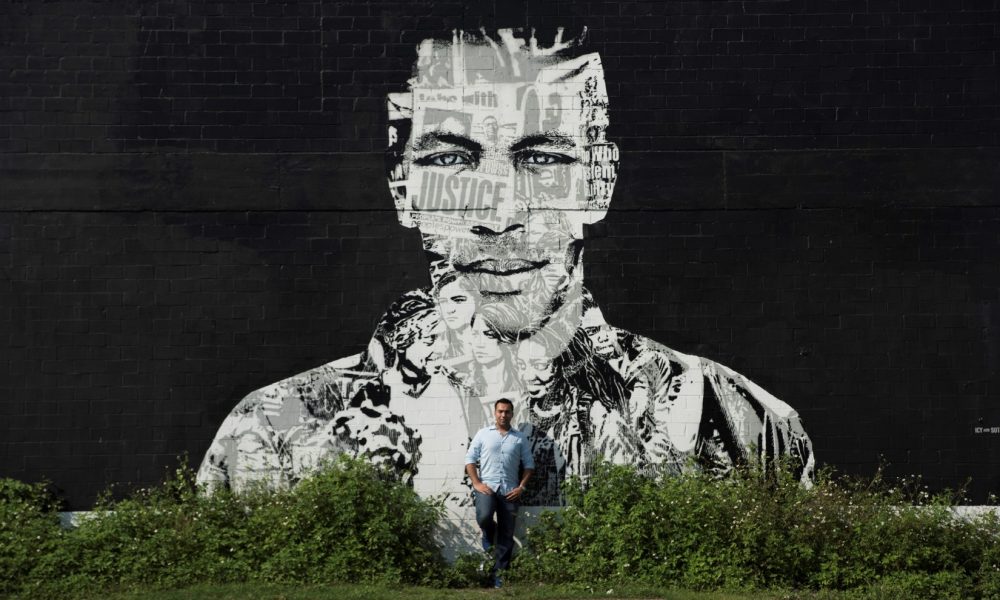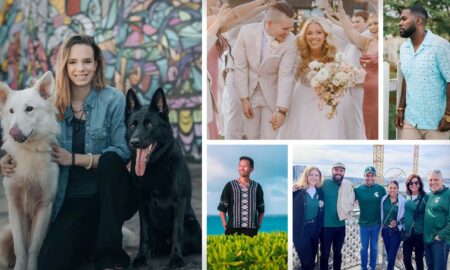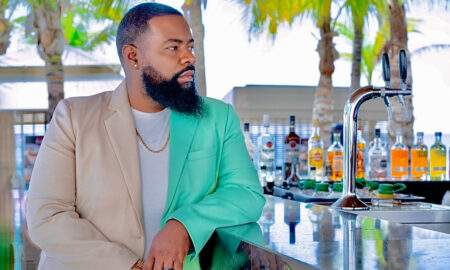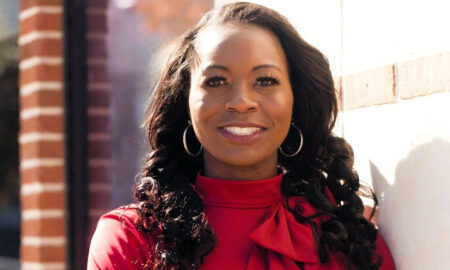

Today we’d like to introduce you to Viktor Kopic.
Thanks for sharing your story with us Viktor. So, let’s start at the beginning and we can move on from there.
Originally hailing from Croatia, and leaving the European country together with my parents during the breakup of Yugoslavia in the early 1990’s, my initial path in life was one that led me to several places across the world before landing in the United States. It was a path and experience that from a young age taught me about both positive and negative elements of humanity, and would leave a lasting impact. It would go on to shape who I am today, and play a part in the decisions that I have made to get to where I am now.
Upon finally settling in the United States in 1999, my father’s work in the shipping industry would move us through several cities and states, beginning in Annapolis, MD, followed by New Orleans, LA before briefly parting ways. My folks would settle in Houston as of 2004 while I went on to complete my degree in Political Science in Baton Rouge, at Louisiana State University. Upon graduating in 2008, I began my career in Washington, D.C. in the think tank industry, working for the Corporate Council on Africa and the U.S. office of the International Institute for Strategic Studies. In a lot of ways, my time in D.C. is where I discovered myself, my potential, where my skills got sharpened, and also where I learned the importance of networking. When I first arrived to D.C. I felt that I was no one; but between engaging and meeting diplomats, hanging out and learning from international security experts, getting to talk with and conduct various research projects for business clients, I was able to raise my profile both amongst my employers and these networks.
However, challenges would arise with my family’s immigration status (due to a filing error by their lawyer), that would lead me to the decision of moving closer to them as we waited to see how things sorted themselves out, and the impact of the final decision outcome on their status. As we waited to see how things played out, I applied for the political master’s program at the University of Texas at San Antonio, which I would begin in 2010. By the time I graduated in 2012, my folks had found out that they would have to leave the country for a short period and reapply for a new visa.
Wanting to play my part and support them as their lives got temporarily uprooted, and take care of their property in Houston, I decided to try and find my next career in Texas. Given that in Houston proper think tanks are almost non-existent, I had to broaden my range of key words looking for initial possibilities. I had just found an opportunity in Dallas, TX with a communications company (the company will remain unnamed, but it did contain the word ‘Vox’… hence, a big clue as to where this story is going), that seemed interesting enough and sent my application. Doing a quick additional search to see if this company had a Houston office, the first page that showed up in my search was that of Vox Culture.
Before finding Vox Culture, I never thought of the idea of actually being part of an advocacy network, much less engaging and working with artists. There were (and still are) specific causes and issues that I felt strongly about, but other than wearing my political hat to occasionally propose and work on policies and conduct analytical research, I realized that while I was reading into what Vox Culture stood for, that I in fact never had really given my voice to a cause… or spoken out either for myself or someone else.
Furthermore, I could visibly see that at the time the organization was in need of structural help and reorganization. The potential for an organization such as Vox Culture, that seemed so unique to me at the time, seemed immense. The ideas and concepts that the organization sought to achieve made me realize at that moment, that if I wanted to raise awareness and partake on educating the public and do good in at least one community before I get old… if I wanted to leave an impact somewhere where I could recognize my works’ fingerprints… and if I wanted to do something big and different and unexpected, this was the opportunity. This was the opportunity to put all my analytical, strategy, communication, and leadership skill sets to work (that I used in D.C.), a chance to be creative, to make mistakes and learn from them, to be a part of what no one else seemed to be doing, all with the hope of achieving community impact.
Reflecting at a personal level, I spent a while pondering at key moments of my life while staring at their webpage. I thought about the vague memories I had as a child and the car ride out of Croatia as war began to break out. I thought about my youth and moments spent in far and away places and the abject poverty and civil strife I witnessed along the way. I thought about my family and my own experience with the immigration system in the United States, and the pain that it had caused especially for my kin. I also thought about the other issues that I cared about and learned about while living in the U.S. and how I had always said that I wanted to do something about it but never had the time. It was through this pondering, that I realized that if I wanted to finally stand for something more, if I wanted to share my voice as part of a community, this was the moment to do so, and Vox Culture was the platform for it.
The flexibility of the board, the founder (Ted Law), and the then Executive Director (Alissa Kitt), allowed the ideas that I had to flourish and help both revamp and give an additional boost to Vox Culture. Fast forward about five years, and since then, the organization has grown in its footprint, established relations and partnerships with dozens of other organizations, community leaders, businesses, and local government entities, and further strengthened its friendships with the artist community and supporting groups. Furthermore, the revamped structure has allowed the organization to engage in social causes at a greater depth, encouraged everyday people to take proactive roles in their community as well as find creative methods of advocacy – using arts as the driving tool.
The successes achieved via Vox Culture have also played a major part in me becoming a better leader and social advocate, and more in tune and aware of the needs and importance of community. The successes have also translated to trust from others and greater engagement with the community at different levels, presently including a presence on two advisory boards for the City of Houston, as well as an advisor for several other non-profits and startups across the city.
Great, so let’s dig a little deeper into the story – has it been an easy path overall and if not, what were the challenges you’ve had to overcome?
Definitely no. Apart from the previously mentioned immigration ordeal that had impact my family and I, during the past five years with Vox Culture I have had to face some significant challenges pertaining to organizational development, leadership dynamics, trust, team turnover, and project failures to name a few.
An enormous challenge for Vox Culture, from an organizational standpoint, has, and continues to be, applying for grants. The model that Vox Culture uses is not one that focuses primarily on addressing one specific type of cause, which is a key point that many foundations tend to want to see. An additional problem early on was also in part our messaging. We used to address ourselves as an “arts and advocacy organization,” which we are, but the messaging caused some confusion early on as to whether we were an arts organization or an advocacy organization. After putting that extra effort in cleaning up our message and how we present ourselves, we were able to attract at least greater interest and funding from the general public, several generous donors, as well as via several corporations and their corporate matching programs.
Leadership dynamic, trust, and team turnover are also challenges that have had to be addressed. When I had initially joined Vox Culture, I was an outsider in a lot of ways. Many of the volunteers and artists that the organization that I had met when I first joined were welcoming and am still friends and keep in touch with many of them. However, in terms of leadership, tensions with less than a handful of core team members (who had been with the organization from the beginning) creeped up during my first year at Vox Culture. These tensions were related to mostly changes that I had promoted that were necessary for the organization, as well as some folks who felt negatively about the leadership at the time touting me as the next potential leader of Vox Culture, which I always guessed was most likely due to me being relatively newer to the organization versus some of the others. These challenges early on would also be related to an initial team turnover of the same individuals, when I formally took the helm at Vox Culture, I was fortunate however that many of the other Core Team members who had been at Vox Culture longer than me did remain and placed their trust in my new leadership, and with their determination to see the organization move forward and begin a new chapter, as well as their initial recruitment of others to join, Vox Culture would go on to continue to thrive. As the years have passed a number of folks would come in as Core Team members and leave their mark on the organization, just as well as folks leaving. The reasons for these are many, ranging from some having spent years with the organization and changes in their lives impacting their involvement, others moving on to pursue other passions or due to work commitments, and others moving on because of different visions they themselves may have had for Vox Culture.
Trust has been a key aspect for making Vox Culture work, both with the Core Team but also with our community partners and the artists we work with. Something I had to learn quickly was how I communicated with artists. Especially in the early days at Vox Culture, I had to learn how to sound less “business” or “politician like” when talking to artists. It is still a challenge but something that I think that I have gotten better at over the years. However, to be able to build that relationship early on, I primarily engaged artists one on one to get to learn more about their arts and passions, and also to see how Vox Culture could provide more to the artists in Houston. A part of the trust that I believe would form over time with the majority of artists I engaged over time, would be by connecting some of them to specific needs that folks in the Vox Culture networks could provide, Furthermore, explaining and showcasing that we did not want to use their gifts for opportunistic purposes, and instead provide them a platform for using their art for social causes that they too cared about, helped strengthen that trust and relationship. Increasing our marketing and promotion of specific artists who took part in our year or specific event projects also showcased that we wanted our relationship with artists to be a two way street, and that the appreciation was not only coming from one direction. I believe in a lot of ways that this relationship and celebration has been epitomized in the Vox Local Arts Mixers that we host every year, where artists that we have recently or currently working with get promoted, and have an opportunity to sell their arts, while mixing and networking with the general public and Vox Culture followers.
Project failures are another area that we have had our bumps along the road. One of the reasons for project failures early on was learning that just because audience members sign up via Facebook as “Going” it doesn’t literally translate to folks showing up. This has led to some projects early on having low attendance. Therefore we learned that sometimes it’s better to think conservatively, use an online ticketing system, and have a backup plan in case the attendance rate ends up being more than expected. A second reason for project failures has been a result of business partnerships, where despite having written contracts, certain businesses have taken advantage of being affiliated with a specific cause, while not keeping their promises or blatantly violating the terms of the written contract. In two cases, these types of situations led to both financial losses but also were damaging to the event itself (with one having to be moved and delayed and the other involving staff attempting to intentionally sabotage the event). Despite this, we have worked with many more businesses that have been excellent community partners, and the negative experiences have been less than a handful of times. However, it was still a learning lesson for us, as we have continuously added to our screening process and ensured that businesses followed the terms of their contract (and being more aware to warning signs) to avoid similar experiences in the future. Project failures have not been only limited to business partnerships, but also to organizational partnerships. While it has only happened once, we have had to terminate our partnership with an organizational partner (and in the process cancel our fall events that year), because of the organization’s poor communication, their internal issues, and inability to communicate with their clients about the work and projects we were creating for them. This was one of the more hurtful and personally upsetting experiences, as the amount of thought and detail that both Vox Core Team members and artists had put in for months beforehand all came undone when the time came to put pieces into action. Since then, we have allotted for more time for the selection process of our potential organization partners (in the shape of a 4-5 month grace period), in order to spend time building a relationship before we even get started with the planned year.
For all of the above issues that have arisen, I have had to confront questions of my own capabilities and sometimes even question whether I was the right leader for certain situations. However, the one realization and takeaway that I would share from these experiences is that, if you are willing to take responsibility (even for the things that are out of your control), you can only become a stronger individual and a better leader. It is through these mistakes that I have been able to work with team at Vox Culture to continue to improve and make us better as an organization. Had it not been for these experiences, and for these failures, it would have never shaped the person that I am today.
Alright – so let’s talk business. Tell us about Vox Culture – what should we know?
Vox Culture is a 501c3 Houston-based advocacy network, whose mission is, “to connect our Houston community to social causes in creative ways.” Through the use of various art forms, collaborations with artists and bringing everyday people together, they seek to address numerous forms of poverty and injustice that affect the city and the world by applying creative solutions through educational, awareness, and fundraising events and projects.
Vox Culture carries out its mission by developing creative programs and events that focus on one social issue per year. The social issues are selected by our core team of volunteers who, together with our artist network and partners, brainstorm and carry out project ideas during our monthly meetings. Vox Culture both reaches out to, as well as accepts applications from, organizations whose main mission is around the same social cause in order to spotlight and provide support to these groups throughout the year as well. Signature events and programs that have developed in recent years and continue to be carried out on an annual basis include Vox Storytellers, the Vox Global Cafe, and the Vox Local Arts Mixer, to name a few. Since our founding, Vox Culture has carried out initiatives on social issues such as: homelessness, malnutrition, human trafficking, environmental health, substance abuse, domestic violence, immigration, refugees, and education. This year’s initiative, called Know Your Neighbors, tackles the topic of racial equality in a variety of ways. Our year’s partners include Project Curate, Iconoclast Artists, and the City of Houston’s Housing and Community Development Department.
As its Executive Director for the past four of the five years that I have been with the organization, my role consists of being the primary leader, visionary, connecter, and catalyst. However much of what I do, and much of what has shaped Vox Culture would be impossible without the existence and tremendous support of our primary volunteer base, the Vox Core Team. This team consists of a diverse group of individuals from a variety of backgrounds. In the creation of the Vox Core Team, it was our intention to create a central supporting team of 20+ volunteers that could function as the engine of Vox Culture. The Vox Core Team in many ways are the source of our pride, as they are representative of not only the diversity of Houston, but also what it means to be a community advocate and contribute to creating unique forms of action, while being a voice for many of the unheard. A lot of what makes Vox Culture function as a fine tuned engine is the energy and dedication that the Core Team members contribute to the organization and the passion that they put in behind their projects.
What sets us apart from others are our diverse and young membership (primarily 21-36 year olds), our fluid approach towards connecting various social issues to one another, and our capability to create a web of connections between the community, business entities, artists, and other non-profit organizations. Most importantly what has set us apart the most from others has been our ability to successfully operate at the intersection of arts and advocacy.
What do you like and dislike about Houston?
What I like most about Houston is its vibe and contradictions. The city keeps on becoming more fast paced, more driven (both literally and figuratively speaking) and you always seem to be on the go. Yet, you can still find time in between to either lay back and relax or do something fun and different (i.e. go to an observatory, drive and spend the day in Kemah or Galveston, etc). Furthermore, with the way the city is developing – whether it be in any area from high rise developments to the growth of the arts scene – it makes you feel like you are part of something much bigger. While many folks already talk about this, the diversity is another aspect that I like about Houston. Whether it be driving down parts of Bellaire, Hillcroft, Richmond, Westheimer, or Airline Drive (to name only a few), the various cultures and ethnic groups that you get to engage with over a matter of blocks or a few miles is almost unparalleled. Being a foodie, I always love engaging new cultures and groups of people over their native cuisine, and so far it’s been hard to name a country’s food that I haven’t tried in this city, or run into someone from a new nationality for the first time, The culinary scene in this city in general is amazing, but it’s really the smaller family owned restaurants that I have tended to enjoy the most. Finally the arts scene is something that I like here in Houston, and is incredibly vibrant.
Frankly, it’s the one thing that made me want to stay in the city after I first moved. I consider myself fortunate to have the opportunity to engage with a number of folks who have either transformed their careers into artists, or have been practicing their entire lives. It is through a number of these individuals through whom I’ve learned the most about Houston, and learned how to appreciate the city at a deeper level.
In terms of what I least like about Houston, I guess I could agree with what most other folks would likely say, and mention the traffic congestion and lack of a proper transportation system compared to other major cities. We can keep throwing money at expanding highways, but with the driving habits of a certain percentage of our neighbors, it’s not really going to fix the congestion. What I do feel needs a mention though, and what I would say is a growing pet peeve regarding the city is in reference to how we use and throw around the word “diversity”. Yes, I know that I may be contradicting myself from the original statement earlier. And before I continue let me mention that I feel most Houstonians are great people, and for a major city, probably has the nicest folks per capita compared to the other major cities that I have lived in the United States. However, with the current social climate that we are living in, and with the work that I do with Vox Culture, it’s hard not to notice that ever since we got named the “most diverse city in the United States,” at least per the statistics, that we have been milking the word for both marketing purposes, and in the case of some of us, to make ourselves feel better and more inclusive. The truth is that there are a number of social issues that exist amongst various communities that many of us continue to brush off as somebody else’s problem (yet still complain about it). Furthermore, we have negatively stigmatized and labeled a group of neighborhoods based on the economic and racial makeup of those specific communities. While I could go deeper on this, I will keep it short and state that Houston needs to work harder to understand and appreciate the people that makeup its diversity, and the challenges that many of them are going through.
Contact Info:
- Address: 8570 Katy Fwy., Suite 116, Houston, TX 77024
- Website: www.voxculture.org
- Phone: (713) 292-4331
- Email: viktor.kopic@voxculture.org








Getting in touch: VoyageHouston is built on recommendations from the community; it’s how we uncover hidden gems, so if you know someone who deserves recognition please let us know here.

















